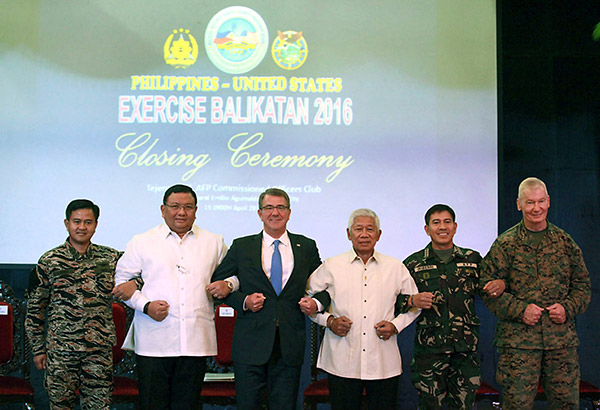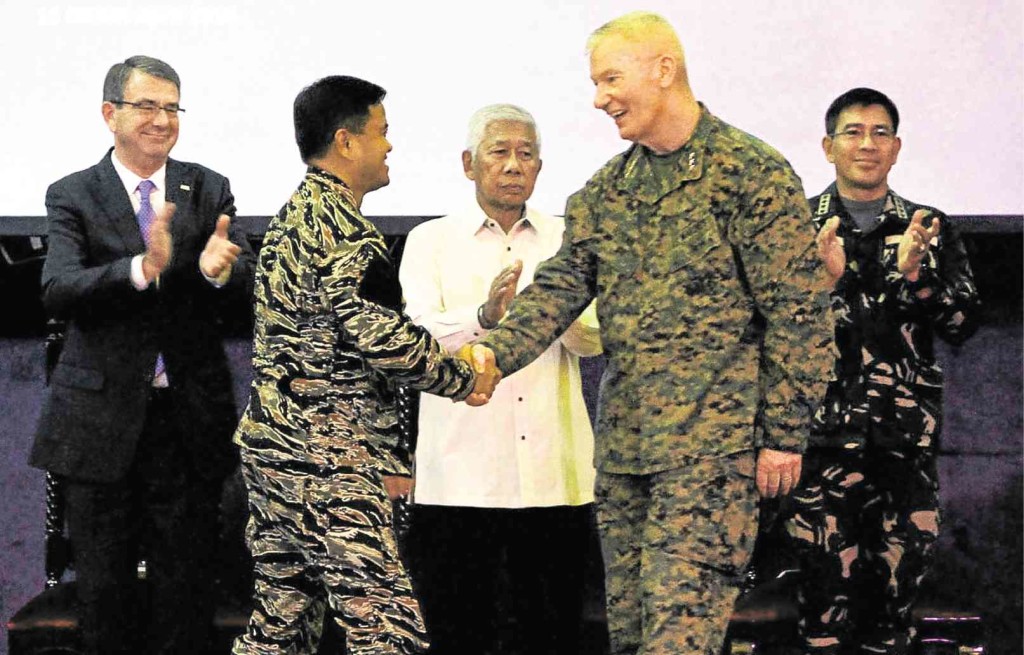From the Philippine Star (Apr 16):
‘US to support Phl vs coercion, intimidation’ Ash Carter visits warship in Spratlys
 Vice Admiral Alexander Lopez (left), the Philippines’ director for Balikatan, and his counterpart Lt. Gen. John Toolan (right), commander of the US Marine Forces in the Pacific, link arms with (from left) Foreign Secretary Jose Almendras, US Defense Secretary Ashton Carter, Defense Secretary Voltaire Gazmin and military chief Gen. Hernando Iriberri during the ceremony marking the end of the annual joint military exercise at Camp Aguinaldo in Quezon City yesterday. MICHAEL VARCAS
Vice Admiral Alexander Lopez (left), the Philippines’ director for Balikatan, and his counterpart Lt. Gen. John Toolan (right), commander of the US Marine Forces in the Pacific, link arms with (from left) Foreign Secretary Jose Almendras, US Defense Secretary Ashton Carter, Defense Secretary Voltaire Gazmin and military chief Gen. Hernando Iriberri during the ceremony marking the end of the annual joint military exercise at Camp Aguinaldo in Quezon City yesterday. MICHAEL VARCAS
ABOARD THE USS JOHN C. STENNIS –
The United States is committed to back the Philippines against coercion and intimidation, Defense Secretary Ashton Carter said yesterday.
The US official issued the pronouncement before visiting the John C. Stennis as the warship sailed close to flashpoint waters of the South China Sea and West Philippine Sea yesterday.
Beijing has reacted defiantly to an American military build-up in the area.
Carter’s trip to the Stennis was the latest effort by the US to show its commitment to maintaining security in the hotly contested waters, where China has rattled nerves by building artificial islands on islets and reefs claimed by some of its Southeast Asian neighbors.
Before flying from Manila to visit the warship, Carter emphasized the US would support the Philippines and other allies as they faced “coercion and intimidation.”
“We will continue to stand up for our safety and freedoms, for those of our friends and allies, and for the values, principles and rules-based order that has benefited so many for so long,” Carter said at a closing ceremony for the annual US-Philippine Balikatan war games.
The roughly two-hour visit to the Stennis came after
Carter announced on Thursday that the US had launched joint naval patrols with the Philippines in the sea, as he spoke of growing concern about China’s “land reclamation” and “militarization” of the region.
He also said the US would deploy hundreds of troops, as well as warplanes, to the Philippines.
China claims nearly all of the strategically vital sea, even waters close to its Southeast Asian neighbors, and has in recent years built the islands in an effort to assert what it insists are its sovereign rights.
The Philippines, Vietnam, Malaysia, Brunei and Taiwan also have overlapping claims to parts of the sea, which is home to some of the world’s most important shipping lanes and is believed to sit atop vast oil and natural gas reserves.
China built the islands on reefs in the Spratlys archipelago, which are close to the Philippines and Malaysia, as well as airstrips capable of accommodating military aircraft.
China in 2012 also took control of Panatag (Scarborough) Shoal just 220 kilometers from Zambales. The shoal is 650 kilometers from China’s nearest major land mass.
Carter visited the Stennis, along with journalists, after making a short flight to the carrier from Antonio Bautista Air Base in Palawan.
“With each Balikatan and each cruise by the Stennis, with each new multilateral exercise and each new defense agreement, we add a stitch to the fabric of the region’s security network,” Carter said in prepared remarks earlier. “This is the network – peaceful, principled and inclusive – America continues to stand for, and stand with.”
“Together you rehearsed maritime interdiction operations so we can respond more quickly to threats at sea and together you simulated the recovery of oil and gas platform for possible forces in the South China (Sea),” Carter said in a speech addressed to troops at the closing ceremonies for Balikatan.
“Through it all, you made our strong alliance even stronger. You helped prepare our nations for this important alliance so we can confront very real challenges,” he added.
“At a time of change in this dynamic region and democratic transitions in the Philippines and the US, we will continue to stand shoulder to shoulder and we will continue to stand up for our safety and freedom, for those of our friends and allies and for the values, principles and rules-based order that has benefited so many for so long,” Carter declared.
The US has already conducted what it calls “freedom of navigation” patrols in the area, sailing within 12-nautical mile territorial limits around disputed islands controlled by China to underscore its right to navigate the seas.
Carter said the US strategy was aimed at maintaining peace and lawful settlement of disputes, not provoking a conflict with a major world power.
“Countries that don’t stand for those things, or don’t stand with those things, are going to end up isolating themselves. But that will be self-isolation, not isolation by us,” Carter said.
The carrier stop caps off a trip to Asia designed to highlight the expanding partnerships the US is building with countries in the region, which Carter said had been asking for a greater US role.
Hundreds of US troops and some aircraft will stay behind in the Philippines temporarily, and on Thursday, the two countries revealed they had begun conducting joint patrols in the South China Sea and West Philippine Sea.
Defiant reaction
China reacted defiantly to Thursday’s announcement of the joint patrols and US deployments to the Philippines, with its defense ministry warning the military would protect the nation’s territory.
“US-Philippine joint patrols in the South China Sea promote regional militarization and undermine regional peace and stability,” said a Chinese defense ministry statement released late Thursday.
“The Chinese military will pay very close attention to related developments and firmly safeguard China’s territorial sovereignty and maritime rights and interests,” the statement read.
The 275 US troops and nine aircraft that Carter said would stay in the Philippines following the Balikatan war games are the first major deployments under the Enhanced Defense Cooperation Agreement finalized in January.
The pact allows US forces to rotate soldiers and military hardware through the Philippines, an important part of American efforts to expand its military presence throughout the Asia-Pacific.
US forces will initially have access to five Philippine military bases, including two close to the hotspot areas of the South China Sea and West Philippine Sea.
Philippine Defense Secretary Voltaire Gazmin on Thursday said he hoped the US efforts would “deter uncalled-for action by the Chinese.”
The heightened US military presence in the Philippines is an important plank of the US so-called pivot to Asia under President Barack Obama.
Chinese foreign ministry spokesman Lu Kang yesterday blamed the US deploying extra forces to the Asia-Pacific for any rise in tensions in the region. “Peaceful settlement of the disputes is what regional countries, including China and parties directly concerned by the South China Sea, aspire to,” Lu told reporters in Beijing.
“Before the US rebalance to Asia, the relevant disputes had already existed for several decades.”
Still, more fun in Phl
At the conclusion of the Balikatan, Foreign Affairs Secretary Jose Rene Almendras told US and other foreign troops “despite the heat of summer, you will agree that it is more fun in the Philippines.”
Thousands of US troops and other military personnel prepared to leave yesterday after their joint military drills with Filipino soldiers, airmen and sailors.
“For our American friends and other foreigners who are here with us, thank you for coming to the Philippines during the hottest period of our year. Thank you for sacrificing the sweat shared with our Filipino soldiers,” Almendras said in his speech at Camp Aguinaldo in Quezon City.
The Philippines, in the past days, has been experiencing extraordinarily hot summer weather due to El Niño weather phenomenon.
More than 10,000 US and Filipino soldiers, and some Australian and Japanese troops, participated in this year’s joint war drill. Officials said the tensions in the South China Sea have nothing to do with the launching of the joint exercises.
Almendras pointed out the bilateral security cooperation between the Philippines and the US has always been a model for other security arrangements, especially for tackling terrorism and improving disaster preparedness and response.
He commended Vice Admiral Alexander Lopez, Balikatan exercise director for the Philippines; and Lt. Gen. John Toolan, exercise director for the US, for the successful conduct of the Balikatan.
He also stressed Carter’s visit to personally observe Balikatan was the first by a US defense chief.
“Secretary Carter, we appreciate your personal commitment to the US engagement in Asia, and the defense alliance of the Philippines in particular,” Almendras said.
“We cannot over-emphasize our appreciation for the principled position by the US government to the territorial and maritime disputes in the South China Sea by upholding the freedom of navigation and unimpeded lawful commerce, non-use of force and threat of force and the peaceful resolution of disputes in accordance with international law,” Almendras added.
http://www.philstar.com/headlines/2016/04/16/1573365/us-support-phl-vs-coercion-intimidation-ash-carter-visits-warshipin











